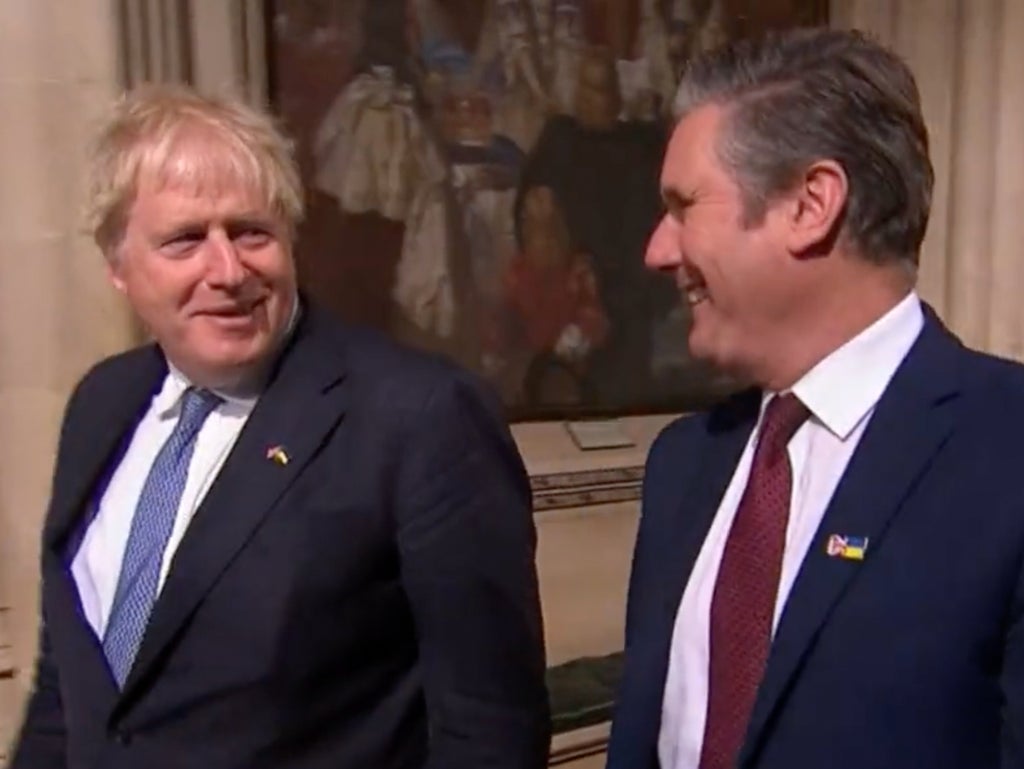
Boris Johnson has been accused of abandoning British families to a life of poverty, after his legislative programme for the coming year contained no new measures to deal with the cost of living crisis.
One think tank described the package set out in the Queen’s Speech as “cosmetic surgery for an economy facing a heart attack”.
Labour leader Sir Keir Starmer also denounced it as “a thin address, bereft of ideas or purpose” delivered by a government “whose time has passed”.
Mr Johnson told MPs that measures including a Levelling Up and Regeneration Bill to enable councils to boost renewal of run-down towns and a Brexit Freedoms Bill empowering ministers to scrap remaining EU rules would help get Britain “back on track” after the Covid pandemic.
But he continued to reject demands for an emergency budget to help households who are being forced to choose between heating and eating.
He also gave a strong signal that he has lined up with chancellor Rishi Sunak in resisting further financial support before the autumn budget, telling MPs: “However great our compassion and ingenuity, we cannot simply spend our way out of this problem.”
Any help for households beyond the £22bn already announced would have to be balanced against the need to keep public finances “on a sustainable footing”, he warned.
Meanwhile, the Treasury was quick to scotch any suggestion of an imminent extension of support, saying that further fiscal measures would have to wait until after the next review of the energy price cap in September.
Senior ministers, including the PM and Mr Sunak, were on Tuesday evening assessing proposals from cabinet colleagues for money-saving measures that can be achieved without cost to the government, such as doubling the gap between MOT tests or increasing the ratio of children to carers in pre-school nurseries. Mr Johnson said the outcome would be announced in the coming days.
But the Child Poverty Action Group said government support was “a far cry” from the help needed by families facing inflation forecast to top 10 per cent this year and energy bills expected to leap by a further £1,000 in the autumn.
CPAG chief executive Alison Garnham said Mr Johnson’s package of 38 bills offered “no short-term comfort for parents struggling to feed their kids in the face of rocketing prices, and no long-term vision for ending child poverty”.
She warned: “Promises on levelling up and education will go unmet while families don’t have enough money to live on – and abandoning 4 million children to a life in poverty won’t be much of a legacy either.”
Responding to a Queen’s Speech, delivered for the first time by the Prince of Wales, Sir Keir said that the contents of the government’s agenda failed to respond to the pressing challenges of the current moment.
With the economy stalling and prices soaring upwards, the Labour leader said the UK was “staring down the barrel of something we haven’t seen in decades – a stagflation crisis”.
And he denounced ministers’ “inertia” in the face of Labour demands for an emergency budget and a windfall tax on the excess profits of energy companies.
“We need a government of the moment with ideas that meet the aspirations of the British public,” Mr Starmer told MPs. But he said that the Johnson administration was “too out of touch to meet the challenges of the moment, too tired to grasp the opportunities of the future ... Their time has passed.”
The Queen’s Speech package included controversial plans to scrap the Human Rights Act, to ban gay conversion therapy while allowing the practice to continue for transgender people and to allow the use of gene-editing to “precision breed” animals and plants.
It set out measures to protect army veterans from prosecution for alleged crimes committed during the Northern Irish Troubles.
But there was no place for the Employment Bill to enhance rights at work, which was promised as long ago as the Queen’s Speech of 2019, or for promised animal welfare legislation to ban the import of fur and foie gras.
TUC general secretary Frances O’Grady said that mooted protections from pregnancy discrimination and rights to flexible working and fair tipping risked being “ditched for good”.
“Bad bosses up and down the country will be celebrating,” she said.
Anti-poverty charity Oxfam branded the failure to prioritise the rights of workers in precarious and low-paid jobs “a dereliction of duty”.
Liberal Democrat leader Sir Ed Davey said that the absence of an Employment Bill meant that family carers would once again miss out on the week’s unpaid leave first promised to them in 2019.
Mr Johnson’s repeated failure to deliver on the pledge was “insulting and woefully shortsighted”, said Sir Ed.
Care England chief executive Martin Green said that the failure to set out plans for much-needed reform of adult social care left a “bitter taste” for the sector.
Dr George Dibb, head of the IPPR think tank’s Centre for Economic Justice, said it “beggared belief” that the government’s programme contained such limited action in response to Bank of England warnings of a shrinking economy over the coming 18 months.
Describing the package as “cosmetic surgery for an economy facing a heart attack”, he said: “This crisis calls for a major restructuring of the UK economy to drive higher wages, productivity, innovation, investment, and faster decarbonisation.
“But the main brake on the economy in the short-term is shrinking household budgets as a consequence of the failure to tackle the cost-of-living crisis. Today’s Queen’s Speech contains almost nothing for families who are struggling to make ends meet.”







